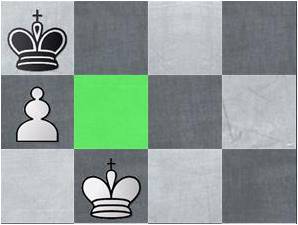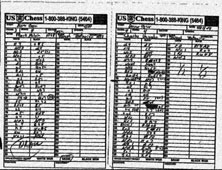Total Chess: Opening Pawn Centers

Opening pawn centers arise as both players develop their pieces and fight for control of the center. The center pawns form a framework or structure around which the pieces move. It is important to understand the different types of pawn centers that can occur, and how to play them. The pawn center determines the style of the game, and what strategies will work best.
There are fluid pawn centers and fixed pawn centers. Every game starts with a fluid pawn center. The center pawns are free to move, and as they move, the pawn structure takes shape.
1) Mobile: Center pawns are not blocked and not open to exchange. Either player may advance a pawn to create a dynamic pawn center.
2) Dynamic: One or more pairs of pawns are open to exchange. The coming play will decide how the dynamic pawn center changes into a fixed pawn center.
3) Dominant: One player has more center pawns than the other player. Generally, the more center pawns you have, the better control of the center you have. It is always your goal to have a dominant pawn center if you can, but it usually does not happen unless the other player allows it or makes an opening mistake.
Eventually, a fluid pawn center settles into a fixed pawn center. When the center pawns are either blocked or captured, a fixed pawn center emerges. The fixed pawn center determines the pace and style of the game.
It is your duty in the opening to guide the pawn center into one that suits your style of play. Some players are aggressive and attacking by nature. They prefer a fast, tactical game and should play for an open pawn center. Other players are passive and defensive by nature. They prefer a slow, positionalgame and should play for a closed pawn center. Still other players are some of both. They prefer a medium pace, all-around game and should play for a semi-closed pawn center. Once you know your style of play, you can steer your games into the type of pawn center that suits you best.
1) Open: All or nearly all of the center pawns are gone. There are no blocked pawns. This leads to a fast, tactical game favoring an aggressive, attacking player. The best strategy here is to develop your pieces quickly, castle your king to safety, and prepare for tactical battles and mating attacks. If you waste time, you could lose material or be checkmated in the opening.
2) Closed: Two or more pairs of center pawns are blocked. This leads to a slow, positional game favoring a passive, defensive player. Since the center is blocked, the best strategy is to maneuver your pieces around the center and prepare for a pawn break on either side of the board. You have time to build your position because tactics and attacks come more slowly.
3) Semi-Closed (or Semi-Open): One pair of center pawns are blocked. This leads to a medium pace, all-around game favoring a flexible, versatile player. The best strategy here is to occupy or attack the center squares to improve your control in the center. Look for an opportunity to advance your center pawns and take more space, or to establish a dominant pawn center. Sometimes a semi-closed pawn center will transition into an open pawn center or a closed pawn center.
Sometimes the pawn center stays fluid until the midgame, or throughout the whole game. The threat of converting to a fixed pawn center is always there, though. Pressure from one player may force the other player into advancing a mobile center or resolving a dynamic center. Remember, it is your job to steer the pawn center into one that suits your style of play.
***
From the book, “TOTAL CHESS: Learn, Teach and Play the Easy 1-2-3 Way,” by John Herron
TOTAL CHESS is your complete guide to chess. It covers everything: rules, strategies, tactics and checkmates.
Everything in chess comes in threes. Three simple strategies are presented for the opening, midgame, endgame, etc. Each lesson is brief and covers one concept in simple language that everyone can read and understand.











Comments: